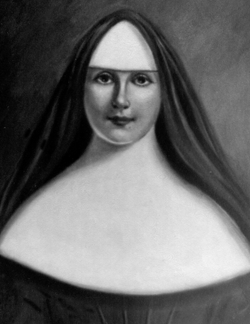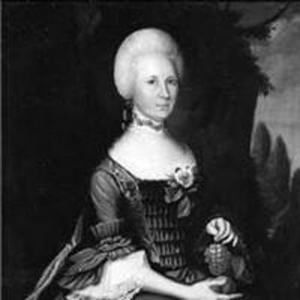Francis Montresor Buchanan may have been surprised at the turns her life had taken as a result of the American Revolution. Born at the onset of the imperial crisis, she had grown up with it and had made conscious decisions concerning with which side, Loyalist or Patriot, she affiliated. Once a member of the new republic, she chose former Patriot revolutionary Ethan Allen as a spouse, after having previously been married to a retired British officer.
At the close of the Revolution, Fanny and her mother were living in the boarding home of Colonel Stephen R. Bradley in Westminster, Vermont, as they sought to claim their rights to Crean Brush’s confiscated property nearby. There, Fanny and Ethan Allen met in 1784, when Ethan Allen was visiting Colonel Bradley, a friend of his, while attending the Vermont Assembly in Westminster. Ethan was 47 years of age and Fanny was 24, but legend has it that they matched wits. Not only was she beautiful, observers said, she was polished and sophisticated—she could play the guitar, speak French fluently, had a beautiful singing voice, was a notable botanist, and was a “lady of New York fashion.” Reverend Fairbanks, a Westminster minister who wrote a history of the town in 1888, stated that
Mrs. Buchanan is spoken of as a “dashing woman,” with an “imperious bearing,” which attracted the attention of the quiet people of Westminster. She is said to have been a “fascinating woman, endowed with an ease of manner, which she had acquired from intercourse with polite society, and possessed of a refined taste and many accomplishments.
During one of his frequent visits to Westminster, Gen. Ethan Allen, who was at that time a widower, formed an acquaintance with Mrs. Buchanan, which afterwards “ripened into a warm, but singularly intermittent friendship.” (588)

Fanny Margaret Allen was the well-educated child of Francis and Ethan Allen. She purportedly shared her mother’s interest in science and her father’s religious skepticism. In 1807, Fanny went to Montreal to study French, where she converted to Catholicism and entered a convent after having a vision. Contemporaries were shocked that Ethan Allen’s daughter had become one of the first Catholic converts and nuns from New England. Fanny spent the rest of her life using her skills to serve the sick and poor as the hospital chemist. After her death, the Religious Hospitaliers of St. Joseph named the Fanny Allen Hospital in Colchester, Vermont, after her. (Image: Artist unknown, printed in the 10th Biennial Report (1911-1913) of the Fanny Allen Hospital, Hotel Dieu of St. Joseph. Public domain, Wikimedia commons.)
Supposedly, when John Norton, the local tavernkeeper, told her that if she married Ethan Allen she would be queen of a new state, Fanny responded, “Yes; and if I should marry the devil, I shall be queen of hell,” an answer which bemused Allen. Despite her response, the prospect seemed to have some appeal to Fanny, who married Ethan Allen shortly thereafter, on February 16, 1784, after Ethan had appeared in the boardinghouse parlor while Fanny was still in her dressing gown on the morning of February 9 and declared, “If we are to be married, now is the time.” Fanny said ‘fine,’ then added that she would need to get her jacket. Fairbanks wrote that “The aversion…with which she at times held the character of the man ‘whom all feared and few loved,’ appears to have given a place to the admiration of his nobler traits, and she consented to become his wife” (588). Their marriage announcement in the Vermont Gazette described Fanny as “a lady possessing in an eminent degree every graceful qualification requisite to render the hymenial bonds felicitous.” (Brown, 278). They departed on a sleigh with Fanny’s belongings to Ethan’s home in Sunderland, Vermont. In 1784, Ethan sold the Sunderland home and the family moved to Bennington, where Ethan could better conduct his land business. Fanny appreciated being in a more cosmopolitan area that was bustling with events and people. She gave birth to their first two children, Fanny Margaret (1784) and Hannibal Montresor (1786) in the Allen’s large rented home in Bennington. Another son, born before Hannibal, died in infancy of whooping cough.
All accounts of Ethan and Fanny’s marriage state that it was a happy one, and that it had a settling effect on Ethan, who retired his penchant to be at the center of the political scene. Nevertheless, each had tempestuous natures. Ethan was a passionate man, heavy drinker, and a critic of organized religion, all of which were unbearable to his first wife, Mary Brownson, who was illiterate and deeply religious, and had a reputation for scolding. Fanny’s more vivacious character may have appealed to Allen after the trials of his previous marriage, which had ended at Mary’s death six months earlier. According to one Ethan Allen biographer, “Fanny was expensive and flighty and sometimes given to sudden flurries of temper, but she was also young and gay and witty. In short, she was everything that Mary had not been.” (Jellison, 315). Fanny and Ethan enriched one another with their intellectualism, she even helping him learn French. Accustomed to considerable wealth, Fanny was reportedly a spendthrift. A lack of currency available in the new Republic strained her spending habits, especially as Ethan was frequently selling and reinvesting in Vermont land as the state’s population grew. Financial difficulties increased in 1785, when Ethan published Reason the Only Oracle of Man, which was not well-received due to its controversial views. On several occasions Ethan faced the threat of debtor’s prison. Nevertheless, Ethan expressed a fondness of Fanny. He gifted a copy of his book to her, the following verses inscribed within:
Dear Fanny wise, the beautiful and young,
The partner of my joys, my dearest self,
My love, pride of my life, your sexes pride,
And partner of Sincere politeness… (qtd in Jellison, 315)
Fanny, Ethan, and their family moved to Burlington, Vermont, in the late summer of 1787. In 1778, Ethan had purchased about 150 acres of land in Burlington from Colonel James Claghorn, “Commissioner for the confiscation and sale of the estates of the enemies of Vermont and the United States.” The land had formerly belonged to loyalist William Marks. By August 1784, Ethan was writing to his brother Ira about plans for constructing a “34 x 24, two-story” house, and proceeded to purchase land until he owned 1400 acres by the time his family settled on the property. Continue reading

